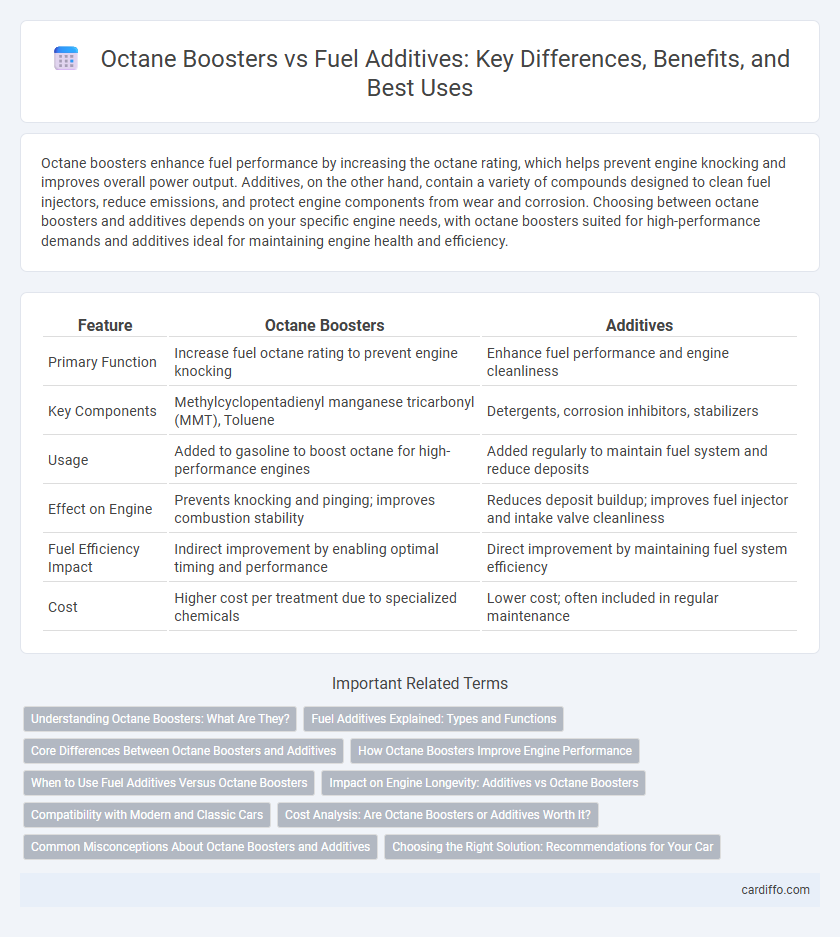Octane boosters enhance fuel performance by increasing the octane rating, which helps prevent engine knocking and improves overall power output. Additives, on the other hand, contain a variety of compounds designed to clean fuel injectors, reduce emissions, and protect engine components from wear and corrosion. Choosing between octane boosters and additives depends on your specific engine needs, with octane boosters suited for high-performance demands and additives ideal for maintaining engine health and efficiency.
Table of Comparison
| Feature | Octane Boosters | Additives |
|---|---|---|
| Primary Function | Increase fuel octane rating to prevent engine knocking | Enhance fuel performance and engine cleanliness |
| Key Components | Methylcyclopentadienyl manganese tricarbonyl (MMT), Toluene | Detergents, corrosion inhibitors, stabilizers |
| Usage | Added to gasoline to boost octane for high-performance engines | Added regularly to maintain fuel system and reduce deposits |
| Effect on Engine | Prevents knocking and pinging; improves combustion stability | Reduces deposit buildup; improves fuel injector and intake valve cleanliness |
| Fuel Efficiency Impact | Indirect improvement by enabling optimal timing and performance | Direct improvement by maintaining fuel system efficiency |
| Cost | Higher cost per treatment due to specialized chemicals | Lower cost; often included in regular maintenance |
Understanding Octane Boosters: What Are They?
Octane boosters are specialized fuel additives designed to increase the octane rating of gasoline, enhancing engine performance and preventing knocking or pinging during combustion. These compounds, often containing ingredients like toluene or MTBE, work by raising the fuel's resistance to premature ignition under high compression. Understanding the chemical composition and application of octane boosters is essential for optimizing engine efficiency and longevity.
Fuel Additives Explained: Types and Functions
Fuel additives enhance engine performance and fuel efficiency by altering fuel properties; octane boosters specifically increase the octane rating to prevent knocking and improve combustion stability. Other fuel additives include detergents that clean fuel injectors and combustion chambers, corrosion inhibitors that protect engine components, and stabilizers that extend fuel shelf life. Understanding these types and their functions helps optimize engine health and fuel economy.
Core Differences Between Octane Boosters and Additives
Octane boosters specifically increase a fuel's octane rating to prevent engine knocking and improve combustion efficiency. Fuel additives encompass a broader range of chemical compounds designed to enhance fuel performance by cleaning injectors, reducing emissions, and preventing corrosion. The core difference lies in octane boosters targeting combustion quality, while additives aim to improve overall fuel system health and efficiency.
How Octane Boosters Improve Engine Performance
Octane boosters enhance engine performance by increasing the fuel's octane rating, which reduces engine knocking and allows for higher compression ratios. Improved combustion efficiency from octane boosters leads to smoother acceleration, better power output, and increased fuel economy. These benefits are particularly critical for high-performance and turbocharged engines requiring premium fuel specifications.
When to Use Fuel Additives Versus Octane Boosters
Fuel additives enhance engine performance by cleaning fuel injectors, improving combustion efficiency, and reducing emissions, making them ideal for regular maintenance and preventing buildup. Octane boosters specifically increase the fuel's octane rating to prevent knocking and pinging, which is crucial for high-performance or turbocharged engines operating under heavy load. Use fuel additives for overall engine health and octane boosters when experiencing engine knock or when recommended for performance tuning.
Impact on Engine Longevity: Additives vs Octane Boosters
Octane boosters primarily enhance fuel's resistance to knocking, improving combustion efficiency but offering limited protection against engine wear or deposits. Fuel additives contain detergents and corrosion inhibitors that actively clean engine components and reduce buildup, directly contributing to extended engine longevity. Choosing additives over solely octane boosters ensures comprehensive engine maintenance and durability.
Compatibility with Modern and Classic Cars
Octane boosters are formulated to increase the fuel's octane rating, enhancing engine performance and preventing knocking, and are generally compatible with both modern and classic cars due to their focus on combustion improvement. Fuel additives encompass a broader range of chemical compounds designed to improve fuel stability, clean the fuel system, and reduce emissions, with formulations that vary in compatibility depending on the vehicle's engine technology and age. Modern vehicles with advanced fuel injection systems often require additives specifically designed to meet strict emission standards, while classic cars benefit from additives that help maintain carburetor function and prevent deposit buildup.
Cost Analysis: Are Octane Boosters or Additives Worth It?
Octane boosters typically cost between $6 to $15 per bottle, providing a quick increase in octane ratings that benefits high-performance engines or fuel with lower octane levels. Fuel additives, priced around $5 to $12 per treatment, offer broader benefits like cleaning fuel systems and improving efficiency, potentially saving money on maintenance. Evaluating cost-effectiveness depends on engine requirements and fuel quality; octane boosters justify their expense for preventing knocking, while additives may offer long-term savings through improved engine health.
Common Misconceptions About Octane Boosters and Additives
Octane boosters are often misunderstood as simple fuel enhancers that increase power, but their primary role is to raise the fuel's octane rating and reduce engine knocking rather than provide more energy. Many assume all fuel additives serve the same purpose, but additives include a wide range of chemicals designed to clean engine deposits, improve combustion, and reduce emissions beyond just altering octane levels. Misconceptions also arise from confusing octane boosters with performance additives, leading to incorrect expectations regarding fuel efficiency and engine performance improvements.
Choosing the Right Solution: Recommendations for Your Car
Octane boosters increase the fuel's octane rating to prevent engine knocking, making them ideal for high-performance or turbocharged engines requiring higher compression. Fuel additives, on the other hand, improve overall fuel quality by cleaning injectors, stabilizing fuel, and reducing emissions, suitable for regular maintenance in all vehicles. Choose octane boosters if your car manufacturer recommends higher octane fuel or experiences knocking, while additives are better for maintaining engine health and fuel efficiency in everyday driving.
Octane Boosters vs Additives Infographic

 cardiffo.com
cardiffo.com